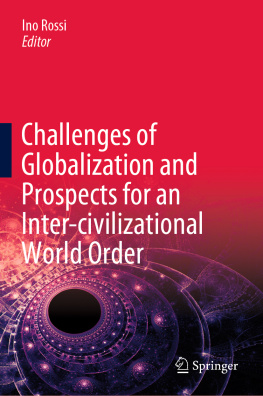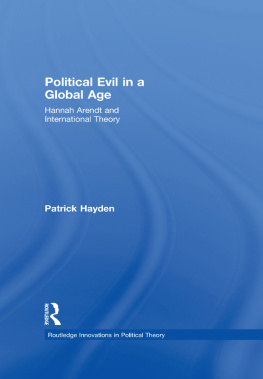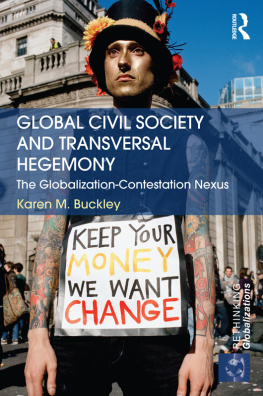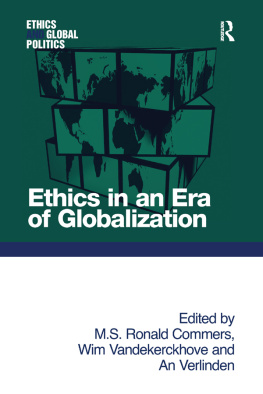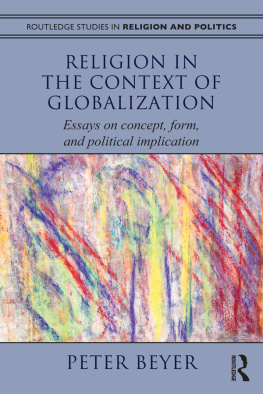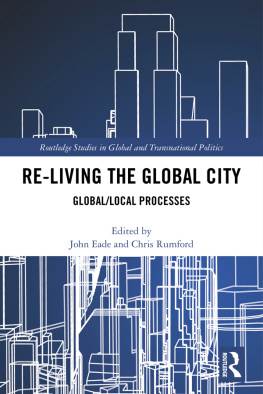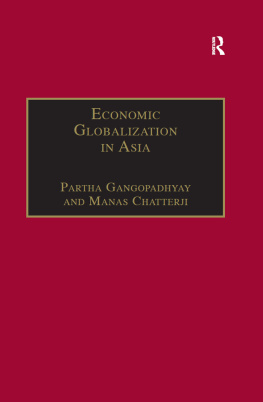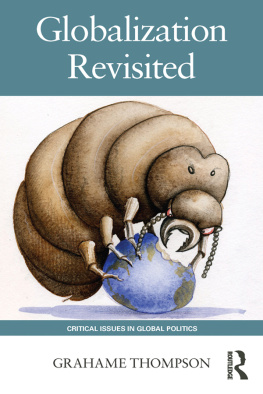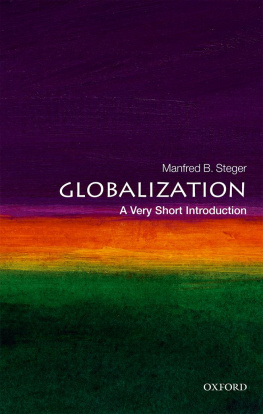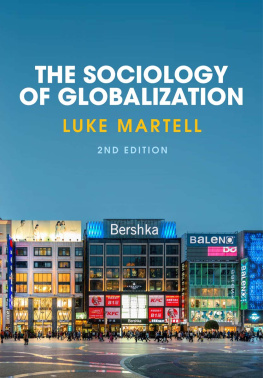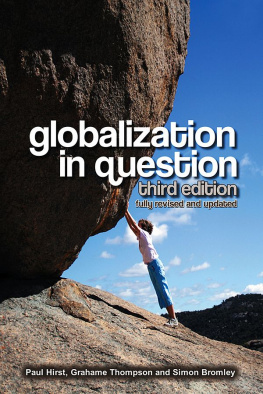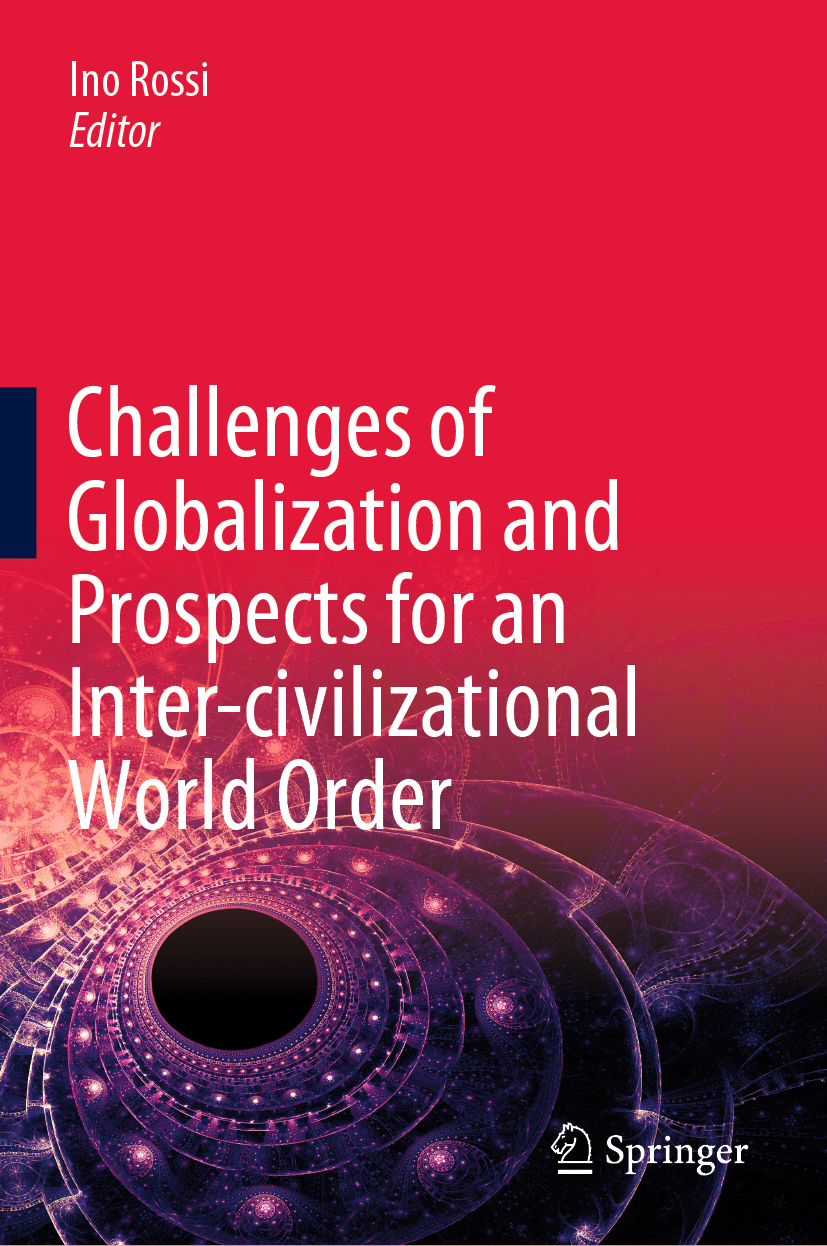Challenges of Globalization and Prospects for an Inter-civilizational World Order
1st ed. 2020

Logo of the publisher
Editor
Ino Rossi
St. Johns University, New York City, USA
ISBN 978-3-030-44057-2 e-ISBN 978-3-030-44058-9
https://doi.org/10.1007/978-3-030-44058-9
Springer Nature Switzerland AG 2020
This work is subject to copyright. All rights are reserved by the Publisher, whether the whole or part of the material is concerned, specifically the rights of translation, reprinting, reuse of illustrations, recitation, broadcasting, reproduction on microfilms or in any other physical way, and transmission or information storage and retrieval, electronic adaptation, computer software, or by similar or dissimilar methodology now known or hereafter developed.
The use of general descriptive names, registered names, trademarks, service marks, etc. in this publication does not imply, even in the absence of a specific statement, that such names are exempt from the relevant protective laws and regulations and therefore free for general use.
The publisher, the authors and the editors are safe to assume that the advice and information in this book are believed to be true and accurate at the date of publication. Neither the publisher nor the authors or the editors give a warranty, expressed or implied, with respect to the material contained herein or for any errors or omissions that may have been made. The publisher remains neutral with regard to jurisdictional claims in published maps and institutional affiliations.
This Springer imprint is published by the registered company Springer Nature Switzerland AG
The registered company address is: Gewerbestrasse 11, 6330 Cham, Switzerland
With an encyclopedic coverage of regions and issues, a set of contributors including some of the best scholarship in the field, and an emphasis on how to deal with the many challenges of globalization, this book makes an important contribution. You could teach a whole class only using this book!
Miguel Angel Centeno, Princeton University, author of War and Society and Building States in the Developing World
This exceptionally diverse, comprehensive set of articles about the many meanings and implications of globalization is certain to become an essential reference work. For covering not just the economic but also the moral, human rights and civilizational aspects of globalization these chapters form the basis for reevaluating and understanding what is happening.
Daniel Chirot, University of Washington and author of You Say You Want a Revolution? Radical Idealism and its Tragic Consequences
Contemporary globalization has traveled a long way since its inception in the late 20th century. This volume is a much-needed comprehensive, updated, and non-Western-centric introduction to the origins, dynamics, and latest trends of globalization as seen from the perspectives of Global North and South.
Ho-fung Hung, Johns Hopkins University, author of The China Boom: Why China Will Not Rule the World
Ino Rossi has brought together a range of authors that covers multiple aspects of our current condition. This diversity of engagements is what we need today to sort out our major challenges.
Saskia Sassen, Columbia University, author of Expulsions
It is the best collection of studies on ecological globalization, latest impact on the Global South, millennia ascent of individual rights, and alternative designs of the future world order. This volume is indispensable for understanding the profound impact of the globalization process in the 21st century.
Alvin Y. So, Hong Kong University of Science and Technology and principal author of The Global Rise of China
To Ryan, Aiden, and Blake
with wishes for a bright future
of hopes and accomplishments
Foreword
Ino Rossi has produced and edited a wide ranging collection of essays on globalization considered in its broadest sense. In his preface, Rossi provides the background of, and rationale for the volume. My main concern here, however, is to introduce briefly and sketch the main points of the book as well as placing it in an even larger and longer context.
There is quite a large number of sketches of the development of ideas concerning globalization. But the most significant aspect of what Rossi calls globalization research is that presently it has become a major aspect of contemporary political, economic, social, and, certainly not least, cultural discourse(s). One should add to this list of themes the overriding significance of worldwide concern with climate change. This has a strong bearing on present concern with the Anthropocene, generally preoccupation with the contemporary increasingly human-made geological condition of the world as a whole.
Even though there are a few climate change deniers, paralleling holocaust deniers, there can be no doubt that this issue has entered the mainstream of global consciousness. Indeed it is almost impossible in contemporary discourse to avoid one aspect or another of the effects or consequences of climate change. At the present time of writing, the heat and the fires in south eastern Australia are providing dramatic manifestations of this. The Australian infernos constitute but one of many manifestations of climate change, including such phenomena in virtually every part of the world as flooding, droughts, hurricanes, salination, melting glaciers, and unpredictable and vacillating weather patterns. Apart from Australia, specific examples of the present crisis include floods in Brazil, Madagascar, Spain, and the USA, while many serious economic problems in Somalia have undoubtedly been caused by a series of droughts and floods. The examples could be multiplied and these are well documented in the reports of the Committee on Climate Change.
Taking place at this time of writing is the annual World Economic Forum in Davos, Switzerland. A highlight, if one may use that term, has been the highly controversial insistence by President Trump that what he calls the apocalyptic, pessimistic thought on climate change is merely left-wing rhetoric. On the other hand, that stance has been thoroughly opposed by the Swedish teenager, Greta Thunberg. Needless to say, both Thunberg and Trump have supporters. However, overwhelmingly support has been on the side of Thunberg.
Climate change, really climate crisis, also involves the making available ofsomewhat paradoxicallyopportunities and incentives for both pleasure and the making of profit. This is well exemplified by the rapid increase in the availability of cheap air flights and, on the other hand, somewhat ironically the development of different forms of green energy and its accoutrements to replace fossil fuels. In other words, there can be no doubt that while climate change as a negative phenomenon is high on the agenda of much of everyday discourse, across the world there are people who undoubtedly benefit, at least in the short run, from its negative consequences.
Coming to the fore in early 2020 has been the health crisis surrounding the rapid spread of the Coronavirus, apparently from Wuhan in China. At the present time of writing, the World Health Organization is considering declaring this health issue a pandemic, classified as a Global Health Emergency. This is the second pandemic of the twenty-first century, following SARS. However, Coronavirus is obviously much more threatening in the global sense than the latter. This kind of issue must be at the very least, connected analytically to any discussion of the frontiers of globalization research.

